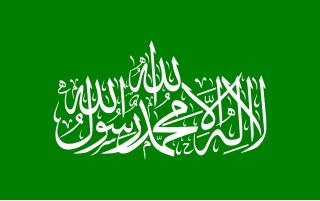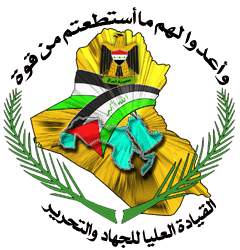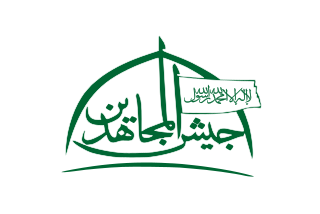
Ansar al-Islam in Kurdistan, simply called Ansar al-Islam, is a Kurdish Islamist militant and separatist group. It was established in northern Iraq around the Kurdistan Region by Kurdish Islamists who were former Taliban and former Al-Qaeda volunteers, which were coming back from Afghanistan in 2001 after the Fall of Kabul. Its motive is to establish an Islamic state around the Kurdistan region and to protect Kurdish people from other armed insurgent groups. It imposed strict Sharia in villages it controlled around Byara near the Iranian border. Its ideology follows a traditionalist interpretation of the Quran and Salafism.

Jamaat Ansar al-Sunnah, also known as Jaish Ansar al-Sunna, Ali ibn Abi Talib Battalion or simply as Ansar al-Sunnah was an Iraqi Sunni insurgent group that fought against US troops and their local allies during the Iraq War. The group was primarily based in northern and central Iraq, and included mostly Iraqi fighters. In 2007, it split; with its Kurdish members pledging allegiance to Ansar al-Islam, and its Arab members creating a group called Ansar al-Sunnah Shariah Committee, before changing its name to Ansar al-Ahlu Sunnah in 2011.

The Islamic Army in Iraq (IAI) was one of a number of underground Islamist militant organizations formed in Iraq following the 2003 invasion of Iraq by U.S.-led Coalition forces, and the subsequent collapse of the Ba'athist regime headed by Saddam Hussein. IAI was regarded as one of the largest, sophisticated and most influential Sunni insurgent groups in Iraq that led an asymmetrical military insurgency against Coalition forces. The group became known for its grisly videos of kidnappings and attacks on U.S. and Iraqi troops.

The 1920 Revolution Brigades was a Sunni militant group in Iraq, which included former members of the disbanded Iraqi army. It was established by the members of the former Ba'ath army of Saddam Hussein in 2003 following the American invasion. The group had used improvised explosive devices, and armed attacks against U.S.-led Coalition forces. The group comprises the military wing of the Islamic Resistance Movement. The group was named in reference to the Iraqi revolt of 1920.

The Mujahideen Shura Council (MSC) (Arabic: مجلس شورى المجاهدين في العراق), was an umbrella organization of at least six Sunni Islamic insurgent groups taking part in the Iraqi insurgency against U.S. and coalition and Iraqi forces: Tanzim Qaidat al-Jihad fi Bilad al-Rafidayn ('al-Qaeda in Iraq'), Jaish al-Ta'ifa al-Mansurah, Katbiyan Ansar Al-Tawhid wal Sunnah, Saraya al-Jihad Group, al-Ghuraba Brigades, and al-Ahwal Brigades.
Jeish Muhammad is an Iraqi militant group that is both politically and religiously motivated. The politically motivated faction within JM is primarily made up of former Ba'athist members mainly from the Sunni region. Many who enjoyed special status during the leadership of Saddam Hussein were from Tikrit, which is in turn within an area of Iraq where the Arab population is mostly Sunni. People who generally hold the ex-vice-president, Izzat Ibrahim ad-Douri, in exceptionally high esteem were members of the security, intelligence and police forces from the previous government.
The Jaish al-Rashideen group was a Sunni Iraqi insurgent group taking part in many guerrilla attacks against U.S.-led Coalition forces using IEDs, sniper fire, and firing rockets and mortar bombs. The group had been operating in Iraq since the middle of 2003. Jaish al-Rashideen conducted its attacks in the volatile Sunni Triangle, Baghdad Belts, Salah al-Din and in western Diyala. Its members are believed to be mostly native Iraqi Sunni Muslims, including persons previously serving in Saddam Hussein's national forces such as the Republican Guard, Special Republican Guard, Fedayeen Saddam and the Mukhabarat.

Hamas of Iraq was a Sunni militia group based in Iraq, which split from the 1920 Revolution Brigades on 18 March 2007. The group claims to have released videos of its attack on US troops. The 1920 Revolution Brigades insists that Hamas in Iraq was involved in assisting US troops in their recent Diyala operations against Al-Qaeda in Iraq. Iraqi Prime Minister Nouri al-Maliki has feared the US-armed 'concerned local citizens' are an armed Sunni opposition in the making, and has argued that such groups should be under the command of the Iraqi Army or police. On October 11, 2007, the militia group joined a political council that embraced armed insurgency against American forces.

The Supreme Command for Jihad and Liberation is an Iraqi front comprising some 23 militia groups formed in October 2007 and were led by former Iraqi vice president and deputy chairman of the Revolutionary Command Council Izzat Ibrahim al-Douri. The name is also often used to refer to the largest militia in the front, the Army of the Men of the Naqshbandi Order, which was commanded by Douri himself.
Political Council for the Iraqi Resistance (PCIR), or the Political Council of Iraqi Resistance, is an Iraqi insurgent political coalition of six major Sunni militant groups operating inside Iraq. The formation of the umbrella organization was announced on October 11, 2007 by a group spokesman in a speech broadcast on the Arabic satellite channel Al Jazeera. The announcement was also published on several jihadist websites. The council's formation is unique in that it is one of the first times Iraq's Sunni insurgent groups have united in an attempt to form a political faction as opposed to a strictly militant one.
The Islamic Army–Al-Qaeda Conflict was part of the sectarian violence in Iraq taking place during the broader conflict of the Iraqi civil war (2006–2008) and the Iraq War that followed the 2003 invasion of Iraq.

Harakat Ahrar al-Sham al-Islamiyya, commonly referred to as Ahrar al-Sham, is a coalition of multiple Islamist units that coalesced into a single brigade and later a division in order to fight against the Syrian Government led by Bashar al-Assad during the Syrian Civil War. Ahrar al-Sham was led by Hassan Aboud until his death in 2014. In July 2013, Ahrar al-Sham had 10,000 to 20,000 fighters, which at the time made it the second most powerful unit fighting against al-Assad, after the Free Syrian Army. It was the principal organization operating under the umbrella of the Syrian Islamic Front and was a major component of the Islamic Front. With an estimated 20,000 fighters in 2015, Ahrar al-Sham became the largest rebel group in Syria after the Free Syrian Army became less powerful. Ahrar al-Sham and Jaysh al-Islam are the main rebel groups supported by Turkey. On 18 February 2018, Ahrar al-Sham merged with the Nour al-Din al-Zenki Movement to form the Syrian Liberation Front.

Liwa al-Muhajireen wal-Ansar, Brigade of Emigrants and Supporters or literally Banner of the Emigrants and Supporters), also known as Jaish al-Muhajireen wal-Ansar, formerly the Muhajireen Battalion, is a Salafi jihadist group consisting of both Arabic-speaking fighters and fighters from the North Caucasus that has been active in the Syrian Civil War against the Syrian government. The group was briefly affiliated with the Islamic State of Iraq and the Levant (ISIL) in 2013, but after changes in leadership, it took an increasingly hostile stance against it. In September 2015, JMA pledged allegiance to the al-Nusra Front.

The Islamic State of Iraq, was a Salafi jihadist militant organization that fought the forces of the U.S.-led coalition during the Iraqi insurgency. The organization aimed to overthrow the Iraqi federal government and establish an Islamic state in Iraq.
The coalition referred to as the Islamic coalition or Islamic alliance was founded in September 2013 in Syria in the context of the Syrian Civil War. It was founded in opposition to the National Coalition for Syrian Revolutionary and Opposition Forces (SNC), and initially included 13 Sunni Islamist groups, including the Tawhid Brigade, Islam Brigade, and Suqour al-Sham Brigade, three members of the Supreme Military Council, which was considered the SNC's military wing. The groups stressed that they remained supportive of Salim Idris' SMC - they were abandoning only the political coalition, saying it "does not represent us." Other members included al-Nusra Front, part of al-Qaeda, and Ahrar ash-Sham. The Islamic State of Iraq and the Levant was not a member, but its joining was not ruled out.

The Army of Mujahideen was a Sunni Islamist rebel group formed in order to fight the Syrian government and the Islamic State of Iraq and the Levant (ISIL) during the Syrian Civil War. Originally a coalition of several Islamist rebel groups, it accused ISIL of disrupting "security and stability" in areas that had been captured from the Syrian government. During its establishment in January 2014, the spokesperson of the coalition said it would start operations in Idlib and Aleppo and gradually expand towards the rest of Syria. In December 2016, the Army of Mujahideen was briefly reorganized as Jabhat Ahl al-Sham, but this formation soon fell apart during rebel infighting in January 2017.

Jabhat Ansar al-Islam, originally formed as Tajamu' Ansar al-Islam in August 2012, is an independent Sunni Islamist Syrian rebel group active in the Quneitra and Daraa Governorates.

Fatah Halab, or Aleppo Conquest, was a joint operations room of Syrian rebel factions operating in and around Aleppo, Syria. Succeeding the Aleppo Liberation operations room, its establishment was announced on 26 April 2015. It stated that its aim was to conquer Aleppo City from Syrian government forces.
Organizations designated as terrorist by Bahrain are organizations that have been designated by the Bahrain government as terrorist organisations. The Ministry of Foreign Affairs maintains a public list of designated terrorist individuals and entities.
Jaysh Ahl al-Sunnah wa-l-Jamaah was an Iraqi Salafi insurgent group that fought against US troops and their local allies during the Iraq War. In 2006 the group aligned itself with al-Qaeda and helped establish the Mujahideen Shura Council.













